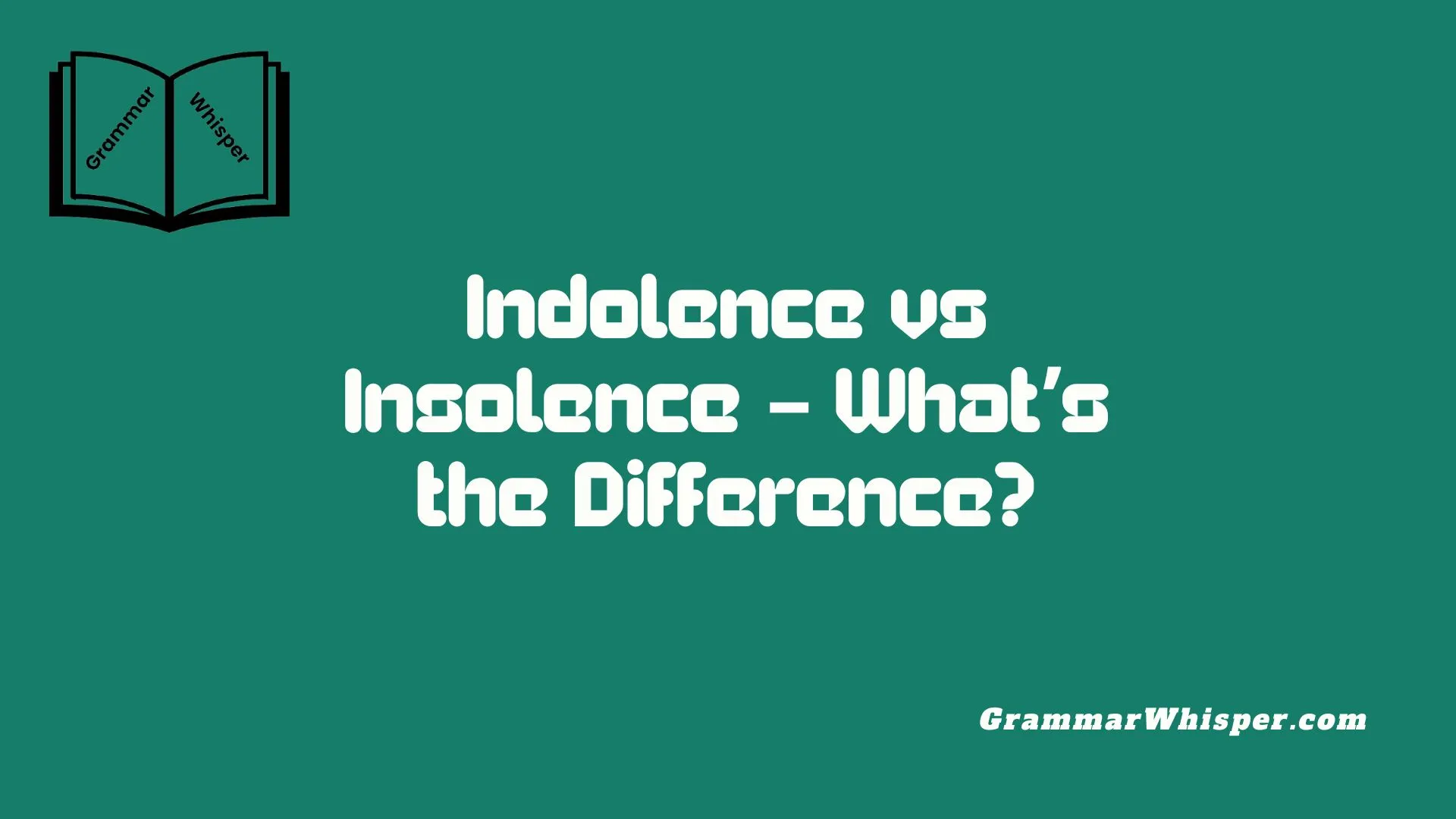Grasping the subtle yet important differences between indolence vs insolence helps avoid misunderstandings in both writing and conversation. These words can look and sound very similar, making it easy to confuse their meanings, which are actually quite different. This guide is designed to help you spot common errors and use the right terms correctly to enhance your vocabulary and language skills.
From personal experience, many people find it challenging to sharpen their understanding, affecting their confidence when polishing communication. Whether writing or speaking, knowing the exact words and how to use them well can make a big difference. Getting this right makes your messages clearer and helps you avoid awkward moments caused by mixing up terms. This small step is essential for building strong language skills and lasting self-assurance.
Why Confusing Indolence and Insolence Can Cost You
Imagine sending an email describing your coworker’s indolence – meaning laziness – but accidentally calling it insolence, which implies disrespect. That mix-up could cause serious offense or confusion. Misusing these words happens more often than you think because of their similar sounds. But don’t worry: by the end of this article, you’ll have a clear understanding of each word’s meaning, usage, and tone. You’ll learn to spot the difference quickly and avoid embarrassing mistakes.
What Is Indolence? Exploring Its Meaning and Usage
Defining Indolence
At its core, indolence means habitual laziness or avoidance of activity or effort. It’s often used to describe a person’s unwillingness to work or exert energy. Indolence isn’t just about being tired or resting – it’s a deeper, persistent tendency toward inactivity or procrastination.
Dictionary definition:
Indolence (noun): avoidance of activity or exertion; laziness.
Contexts Where Indolence Applies
Indolence is most commonly applied when discussing character traits, work ethics, or behaviors related to motivation. For example, someone might blame their lack of progress on indolence rather than external factors. It’s generally negative but less confrontational than words like lazy because it sounds more formal.
Indolence vs Temporary Laziness
It’s important to note that indolence implies a pattern or disposition, not just a momentary lapse. Taking a day off to relax isn’t indolence; chronic avoidance of responsibility is.
Example Sentences Using Indolence
- His indolence kept him from finishing the project on time.
- The novel explores the dangers of indolence in a rapidly changing society.
- Despite his talent, indolence prevented him from reaching his full potential.
What Is Insolence? Understanding Its Meaning and Usage
Defining Insolence
On the flip side, insolence refers to bold disrespect or rudeness, especially toward someone in authority. It’s an attitude or behavior that shows a lack of respect or manners.
Dictionary definition:
Insolence (noun): rude and disrespectful behavior or speech.
When Do We See Insolence?
Insolence often shows up in interactions – think of a student talking back to a teacher, or an employee speaking rudely to a boss. The word carries a sharp tone and often implies intentional defiance rather than accidental disrespect.
Degrees of Insolence
Insolence ranges from mild cheekiness to outright disrespect or rebellion. The context often determines how serious it is. For example, a sarcastic joke could be called insolent if it challenges authority, but it might also be playful.
Example Sentences Using Insolence
- The manager reprimanded the employee for his insolence during the meeting.
- Her insolence shocked the guests at the formal dinner.
- Insolence toward elders is frowned upon in many cultures.
Indolence vs Insolence: How to Spot the Differences
To clear up confusion, let’s put these two words side by side:
| Aspect | Indolence | Insolence |
| Meaning | Laziness, avoidance of effort | Rude, disrespectful behavior or speech |
| Tone | Neutral to negative, implies inactivity | Negative impliess defiance or disrespect |
| Context | Character trait, work ethic | Behavior in social or authority interactions |
| Emotional Impact | Lowsuggeststs slowness or carelessness | High suggestss conflict or offense |
| Synonyms | Laziness, idleness, slothfulness | Impertinence, cheekiness, insolenceRemembering |
gg the Difference
Try this quick mnemonic:
- Indolence starts with I for Inactivity.
- Insolence starts with in but think In-your-face disrespect.
The Origins: How History Shapes the Words
Understanding where these words come from can help you remember their meanings and appreciate their nuances.
- Indolence derives from the Latin indolentia, meaning freedom from pain or trouble. Over time, it evolved to mean avoidance of effort, linking laziness to avoiding discomfort.
- Insolence comes from Latin insolentia, meaning arrogance or immoderate behavior. This roots the word in defiance and disrespect.
Avoiding Common Mistakes: How Spell-Check and Autocorrect Can Let You Down
Modern technology helps us,but also trips us up:
- Spell-check may not flag “indolence” vs “insolence” errors because both are correct words.
- Autocorrect can sometimes change one word to the other if it thinks you made a typo.
- Rely on context, not just spell-checkers, to confirm your word choice.
Quick Self-Check Before You Send
- Ask: Am I describing laziness or disrespect?
- Replace the word with “laziness” or “rudeness” to see if the sentence still makes sense.
- Read the sentence aloud to hear if it sounds like talking about attitude (insolence) or behavior (indolence).
How to Use Indolence and Insolence Like a Pro: Practical Tips
You want to sound sharp and precise, right? Here’s how to elevate your vocabulary game with these two words:
- UsUsing eindulgence when talking about habits, motivation, or work ethic.
- Choose insolence when referring to disrespectful or bold behavior, especially in social or formal settings.
- Avoid mixing these words in casual conversations; they work best in writing, formal speech, or analytical discussion.
Synonyms to Expand Your Vocabulary
| Indolence Synonyms | Insolence Synonyms |
| Laziness | Impudence |
| Idleness | Impertinence |
| Slothfulness | Audacity |
| Lethargy | Disrespect |
Practice Exercises
Try these sentences, swapping the correct word in place:
- His ___ prevented him from completing the task.
- The child’s ___ angered the teacher.
Real-Life Case Study: When Mixing These Words Backfires
In 2019, a public figure was criticized for a speech where they accused a rival of “indolence” when the intent was to call out disrespectful behavior. The media pounced on the mistake, twisting the meaning and damaging the speaker’s credibility. This example highlights why knowing the exact meaning matters – words carry weight.
Recap: Mastering Indolence and Insolence
- Indolence means laziness or avoiding effort.
- Insolence means rude or disrespectful behavior.
- They sound similar but apply in completely different contexts.
- Always consider tone, meaning, and situation before choosing which to use.
- Double-check your writing to avoid embarrassing mistakes.
Final Thoughts
- Detailed word definitions and usage examples.
- Historical origins and etymology.
- Grammarly Blog – Tips on word choice and writing style.
With this knowledge, you’re ready to use indolence and insolence correctly and confidently. Next time you want to talk about laziness or rudeness, you’ll know exactly which word fits the bill. Remember, precise words lead to clearer communication – and that’s a win every time.
FAQS:
What is the main difference between indolence and insolence?
Indolence refers to laziness or avoidance of effort, while insolence means rude or disrespectful behavior. Indolence is about inactivity, insolence is about attitude.
Can indolence ever be a positive trait?
Generally, indolence has a negative connotation because it implies laziness. However, in some contexts, taking time to rest and avoid unnecessary stress might be seen as self-care, but this isn’t true indolence.
How can I avoid mixing up indolence and insolence in writing?
Focus on the context: if you mean laziness, use indolence; if you mean disrespect, use insolence. Also, try substituting “laziness” or “rudeness” to test which fits better.
Are there any synonyms that can replace both words?
No, their meanings are quite different. Use synonyms like laziness or idleness for indolence, and rudeness or impudence for insolence.
Is insolence always intentional?
Usually, insolence involves intentional disrespect or boldness. However, sometimes it can be unintentional due to cultural misunderstandings or tone.











